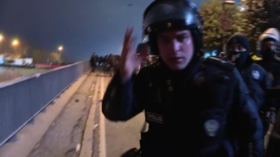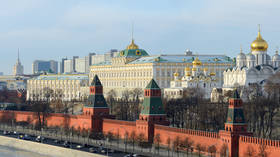German lawmakers approve significant relaxation of lockdown rules for fully vaccinated citizens
German lawmakers have passed a law which will ease Covid-19 restrictions for people who have been fully vaccinated against the coronavirus or who have recently recovered from the disease, in a majority vote.
The law was supported by members of the government coalition – Chancellor Angela Merkel’s conservative ‘Union’ bloc and the Social Democrats – as well as the Greens and the Left Party.
The right-wing Alternative for Germany (AfD) party was the only one that voted against the government’s proposal, saying it did not go far enough, while the liberal Free Democrats abstained. AfD MP Ulrich Oehme explained his faction’s decision by accusing the government of managing the situation through “backdoors” and pitting Germany’s population against each other.
Also on rt.com German cabinet eases Covid-19 lockdown measures for those who’ve had their vaccineThe easing will now need approval from the Bundesrat, another house of parliament representing the 16 federal states. If it greenlights the legislation on Friday, as expected, it could come into force at some point during the weekend.
If passed, it will allow fully vaccinated people and those who have just recovered from the disease to meet other people without restriction. They will also be allowed out of their homes during the night-time curfew between 10pm and 5am.
Vaccinated people will also be able to go shopping or have their hair cut without presenting a negative Covid-19 test – but will be asked to show a vaccination certificate instead.
Those fully vaccinated also no longer fall under the rule limiting the number of people attending any private or public gatherings. That means that members of one household can meet with one unvaccinated person outside of it and an unlimited number of vaccinated people.
However, regardless of vaccination, they will still need to follow social distancing rules and mask-wearing in public spaces – and will need to carry a special yellow ID proving their status.
Also on rt.com Top German court upholds temporary Covid-19 lockdown law, rejects requests to abolish curfewsGermans who have recovered from the disease but are not vaccinated, should present a positive PCR test that is at least 28-days-old but no older than six months to be exempted from the lockdown rules.
Meanwhile, the government is warning that the emergence of new “worrying virus variants” could prompt another change in the rules since there might be “insufficient knowledge about the effectiveness of immunization” against such strains.
So far, more than seven million Germans are fully vaccinated against Covid-19 – about 8.6% of the population. Another 25.5 million people – just over 30% – have received their first dose. On Wednesday, more than one million Germans were vaccinated in just one day, local media said.
Berlin has implemented tough measures in the fight against what it calls the ‘third wave’ of the epidemic. In April, lawmakers approved amendments to the Infection Protection Act proposed by the government that introduced binding harsh restrictions for all federal states surpassing a certain threshold infection rate.
Currently, all but four German federal states fall under the law’s restrictions.
Also on rt.com ‘Has to be taken seriously’: Police investigate DEATH LIST of German MPs after vote on lockdown lawThe rules included a night-time curfew, severe limitations on public gatherings, as well as restrictions on retail and services sectors. They were met with major public backlash as a flurry of complaints were filed with the German Constitutional Court, arguing that the restrictions infringe upon people’s basic rights. German police also launched a probe into ‘death lists’ circulating on the interment and containing the names of the lawmakers who supported the bill.
On Wednesday, the Constitutional Court upheld the lockdown law and rejected appeals to temporarily suspend the night-time curfews.
Think your friends would be interested? Share this story!














